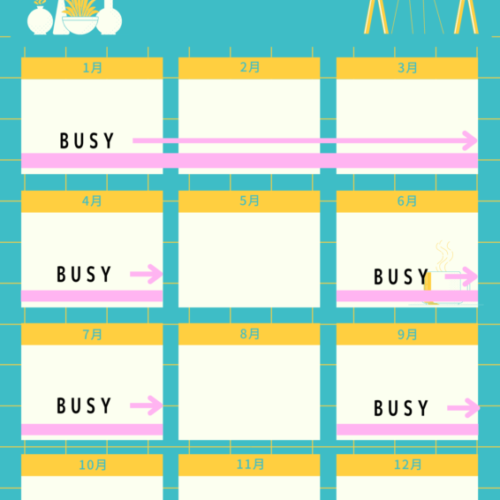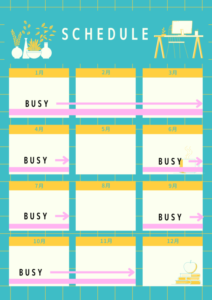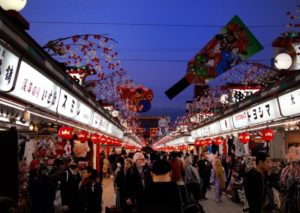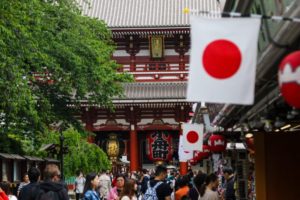Search no more! Just read this
If you are working in Japan already or thinking of working in Japan, you might be wondering when companies are hiring and when is the best time to start job hunting. There are countless resources out there and you can easily be flooded with similar content. Planning your job hunting in Japan can take forever, and you may not even end up working in Japan, just because you got tired of searching.
To save you time, we’ve decided to make a complete guide to scheduling your job hunting in Japan! By reading this article you will be able to completely understand the following 5 points.
- 1. How to even plan your job hunting schedule in the first place
- 2. When companies start hiring
- 3. When you should start your job hunting
- 4. Scheduling your interviews
- 5. Job hunting trend in Japan
This article will not just be a list of hiring schedules for each industry/company out there, but it will be published with the goal for everyone who is looking for a Job in Japan to get the dream job in the shortest and most efficient way possible.
So let’s get right to it! (If you already think that you know enough about a certain topic, please go ahead and jump to the next section from the table of contents above.)
Use career agents and job boards wisely
We’ve all experienced that troublesome feeling of going through an individual company’s hiring page and checking whether they’re hiring right now or not. Typically, in Japan, most people get this information from either their career agents or job board sites. There are several benefits you gain from using these services.
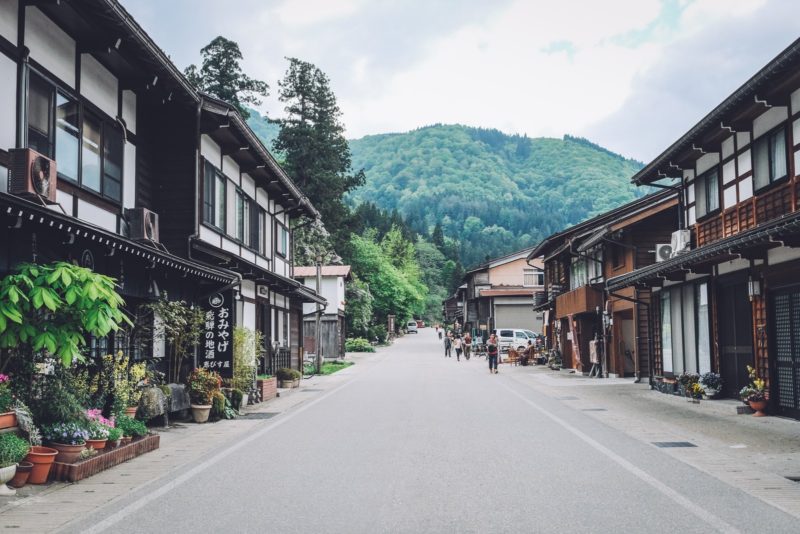
First, if you have talked and consulted with the career agent before, the career agent will know what kind of jobs you might be looking for. They can give you a selected list of job openings, which can save you a lot of time skimming through the list of unmatched occupations for you.
On the other hand, you have to be careful when using a career agency service because the career agent might be selecting job postings that are beneficial to them. Sometimes they request companies that might not completely match you, so you should always use a job board website as well.
Job boards are especially useful because you get to find interesting jobs that you may have never heard of before. Job boards allow you to search, filter and sort job postings and make searching for job opening easy. However, it is still difficult skimming through all the information, because the enormous amount of job listings there are on the website. If you think it is taking too much time to search, you might want to consider using a more specific/targeted website for you. These can be job boards aimed at recently graduated or engineers.
We’ve written a full article about career agents and job board websites in Japan, so please have a look at these as well if you want to know more about this topic.
1. How to even plan your job hunting schedule in the first place
You might already be using career agent services and job board sites. However, you might now be scheduling your job hunting process properly or might not even know that a job hunting schedule even exists in Japan and that you might miss out on some companies if you don’t plan it out properly.
The most thing you should do when starting your job hunting in Japan is to know when companies are hiring and how long the hiring process takes.
You should first learn the hiring season of each industry/company and plot it out on an excel sheet or a schedule management tool. At xkula.com, we have created a Job hunting schedule management tool for job hunting in Japan! Job hunting in Japan has never been easier with this tool. Click the link below to start scheduling your job hunting in Japan! ↓↓↓
For more information about how to plan your job hunting schedule in Japan, please read the “note” tab in the link above.
2. When companies start hiring
Each company has a different season for hiring. If you are a new grad, there is a certain pattern you should follow. For new grads, typically most Japanese companies start their application in March at the end of the junior year. Foreign companies, they start the application process as early as the spring of Junior year.
You can learn more about the hiring schedule for new grads from the link below.
If you are a mid-career job seeker then companies will be hiring candidates all year long. However traditional Japanese companies tend to hire mid-careers between January – march, and July – September. Under this schedule, you will be joining the company, usually in April or October. This is because the corporate fiscal year often begins in April, and October is just half a year after April.
3. When you should start your job hunting
Now that you know when companies hire in Japan, you should also be aware of when is the best time for you to do job hunting. Through out the year, there are busy periods where there are a lot of job openings and companies are more willing to hire people. The image below shows the annual schedule of the “typical busy period” when Job hunting in Japan.
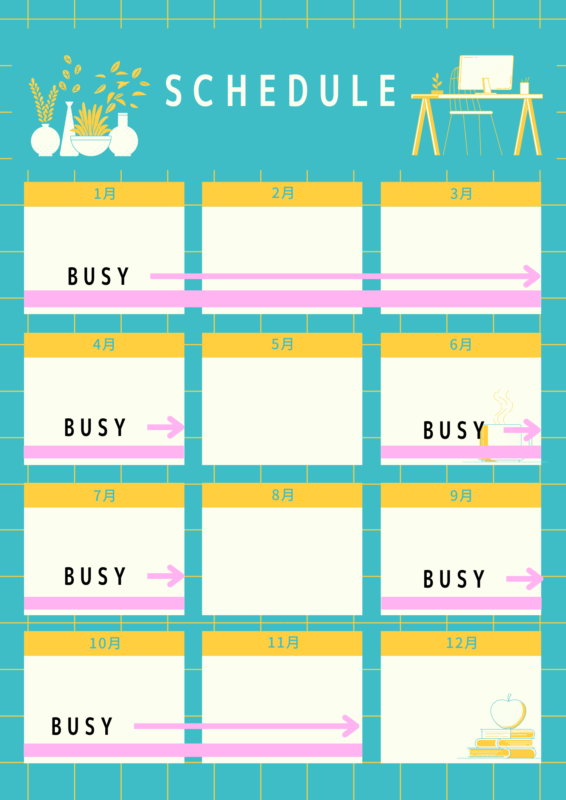
In Japan, May, August, and December are the laid-back season for job hunting. In other words, January to April, June to July, and September to November is the busy period. The laid-back season has a lot of holidays, such as the golden week, Obon, and the year-end holidays.
Ideally, you would want to start your job hunting before the laid-back period. Job hunting typically takes 2 to 3 months. If you start your job search after the laid-back period, there is a possibility that you will not be able to meet your desired start date. If you have the desired start date, you should begin your job search before the “laid back period” to give yourself more time.
4. Scheduling your interviews
In Japan, whether it is a Japanese company or a foreign company, there will typically be 2 to 3 interviews before you receive an official offer letter. Therefore, you need to be prepared for interviews that occur every 1 to 2 weeks. If it is a typical interview, your preparation may take up to 1 or 2 days. However, if it is a tech role or any other specific role which requires a skill assessment, you might want about 1 to 2 weeks to prepare.
You also want to make sure that your daily schedule isn’t too busy because you might have to take some time off of your work, in order to take the interview.
5. Job hunting trend in Japan
Japan is known for its culture of new graduate hiring, lifetime employment, and seniority. Here is a graph that displays the percentage of new grad hires and mid-career hires in Japan. This graph was taken from the “Employment Security Bureau, Ministry of Health, Labour and Welfare”.
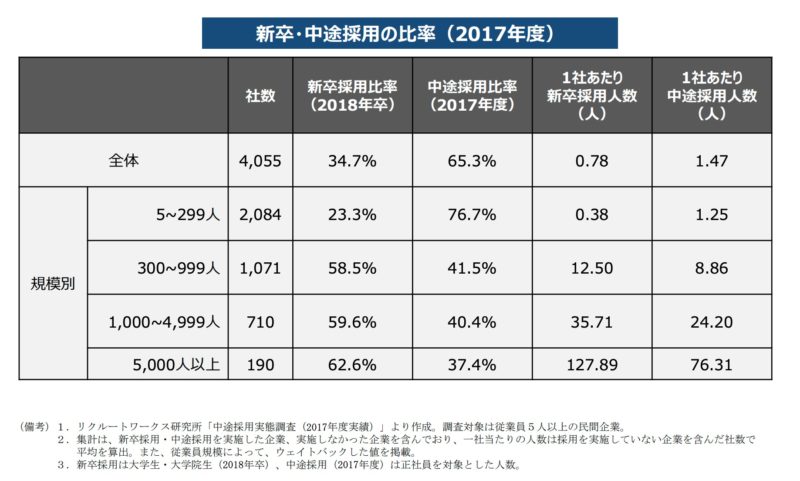
When you look at this graph, you can tell that overall, 34.7% of the workers in Japan joined the company as a new-grad and 65.3% joined as mid-career. On the other hand, when you look at companies that hire more than 5000 employees, 62.6% joined the company as a new grad and 37.4% joined as a mid-career. This shows that the bigger that company becomes, the percentage of people who joined the company as a new-grad increase.
However, in Japan, the number of workers who are switching jobs is increasing. According to this document, created by the “Statistics Bureau, Ministry of Internal Affairs and Communications” you can tell that both the number of job changes and the ratio of job changes are increasing. This trend indicates that there will be more people in Japan switching jobs in the future.
You’re all set!
Thank you for reading all the way through this article. Now you are all set for your dream job in Japan! If you want to learn more about companies in Japan and the work culture, environment, and opportunities in Japan, please have a look at xkula.com.
Xkula is a company review site for English speakers in Japan. You can share your work experience in Japan and read reviews submitted by others. You can easily submit your review here, and the review will take about 10 minutes. Xkula also provides exclusive articles about life in Japan and useful tools such as a list of useful Japanese business phrases and a list of recruitment pages for companies in Japan.
